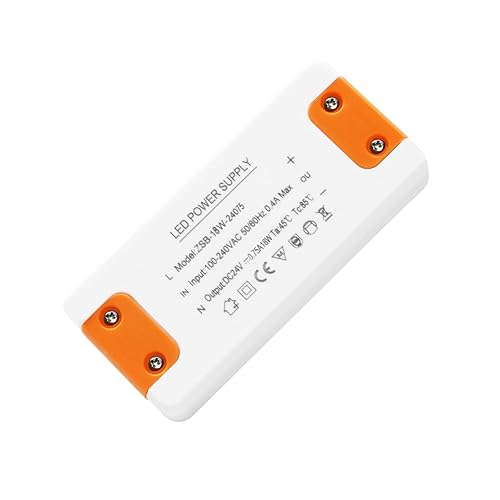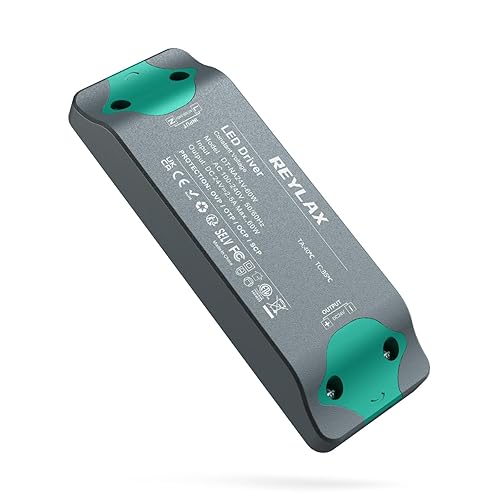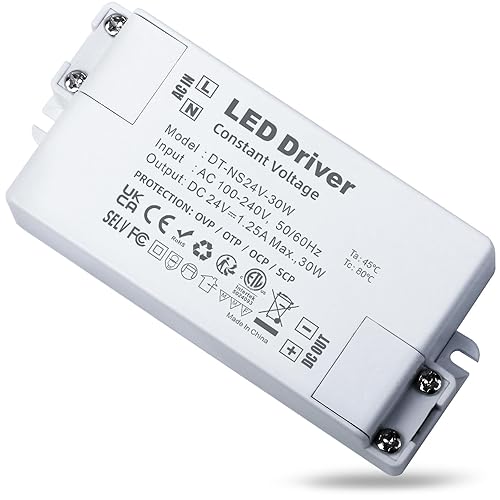How to Choose a 220V 24V Transformer in 2025? Guide and Comparison
220V 24V transformers play a crucial role in powering various devices that require a lower voltage than the standard electrical grid. Whether you're a DIY enthusiast, a professional, or someone looking to install an LED lighting system or power electronic devices, selecting the right transformer is essential to ensure safety and efficiency.
See also: the best 220V 12V transformers
Our TOP 3
ZAKVOP

Pros
- Good functionality for LED strips
- Simple and quick connection
Cons
- No major reported defects
Specs
REYLAX 60W

Pros
- Solid, compliant
- No flickering or buzzing
Cons
- Inconvenient rectangular cable hole
Specs
Selection Criteria
Power and Load Capacity
The transformer's rated power is a determining factor. Expressed in watts (W) or volt-amperes (VA), it should match the energy needs of the device you wish to power. For example, if you have a total load of 50W, choose a transformer with at least 10-20% additional capacity to avoid overloads, approximately 60W.
Energy Efficiency
A transformer with good energy efficiency minimizes heat loss, which is beneficial for prolonged use. Look for those with efficiency above 90%, indicating optimal power conversion.
Voltage Regulation
A good transformer delivers a stable voltage despite load fluctuations or input voltage changes. Ensure it offers effective voltage regulation, often specified in technical characteristics as "regulated" or "switching" type.
Certification and Safety Standards
It's crucial that the transformer is certified to comply with local and international safety standards, such as CE or UL. This ensures not only quality but protection against short circuits, overloads, and other electrical hazards.
Common Mistakes
Underestimating Required Capacity
Underestimating the required power is a common mistake that can lead to overloads and premature transformer failure. Always calculate the total required power with a safety margin.
Ignoring Installation Specifics
Some users neglect installation conditions, such as ventilation and humidity, which can short-circuit the equipment. Always install the transformer in a well-ventilated and dry space.
Buying Based Solely on Price
Choosing the cheapest model may seem economical in the short term, but it can increase the risk of failure and danger. Always prioritize quality and compliance with standards above other factors.
Comparison of our 3 favorite products
ZAKVOP- Best for compact and versatile installations

The ZAKVOP transformer offers a compact solution for those looking to power their LED lights reliably and efficiently. Its small size makes it the ideal choice for tight spaces, while offering easy installation.
Pros
- Ease of installation
- Compatibility with various types of LED
- Built-in overheat protection
Cons
- No detailed value-for-money report noted
REYLAX 60W- Ideal for powerful flicker-free LED applications

The REYLAX 60W stands out for its strong capacity to provide stable power, eliminating flickering and buzzing noises often associated with other transformers.
Pros
- No flickering or buzzing noise
- Robust protection mechanisms
- High energy efficiency
Cons
- Rectangular cable hole that might complicate installation
REYLAX 30W- Suitable for discreet and lightweight installation

The REYLAX 30W is designed to be hidden in tight spaces, while offering reliable performance for bright LED applications.
Pros
- Good concealment in the environment
- Initial flicker-free performance
Cons
- Random flickering after a few seconds of use
Practical Tips
- Long-term Planning: Choose a transformer capable of handling additional future loads to avoid having to buy a new one in the short term.
- Test Before Installation: Use a multimeter to check the transformer's output before connecting it to your equipment.
- Regular Maintenance: Conduct regular inspections to prevent potential problems, such as signs of wear or overheating.
FAQ
See also: the best 220V 12V transformers